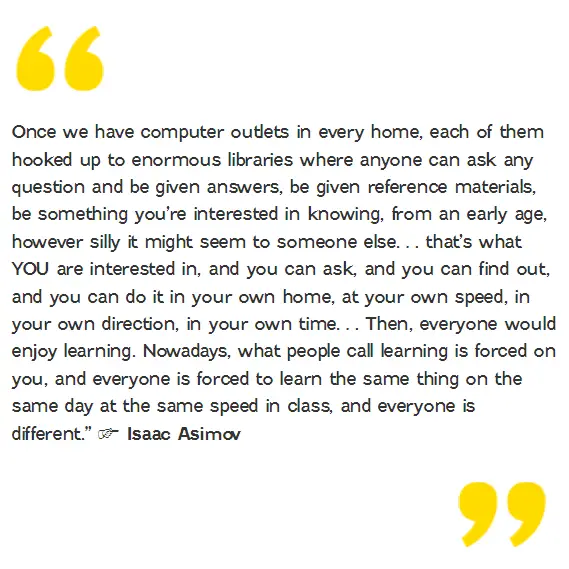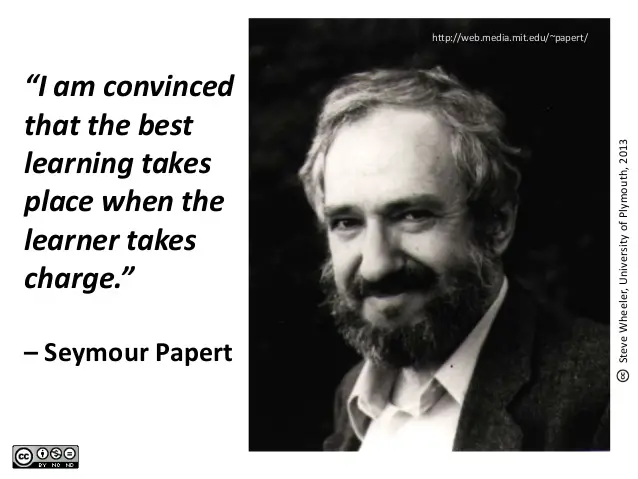Learning To Empower Yourself: Take Charge of Your Education

Best learning happens when the learner takes charge. Learn to uncover your values and passions, and design your own learning journey. By Devavrat Ravetkar
Why do you learn what you learn? In fact, why do you do whatever you do in life? Do you enjoy what you do? These questions have proved to be the essential guidelines as I pursue my self-directed learning.
I am reinventing education for myself. I am taking control of how, what and why I learn. I am pursuing my passions. Taking the wild, untrodden route and creating new paths can feel exciting and scary at the same time. While you have unbounded freedom to learn and do whatever you wish to, you also have the uncertainty since this is not a structured curriculum where all you have to do is follow instructions to be successful. Here's Isaac Asimov's prescient quote from 1988 on how computers and internet can personalise education for everyone, empowering people to pursue their interests and take active part in designing and directing their learning journeys!

So, in the land of self-directed learning, even though there will be no formalities to slow you down and bore you, you will find it a strange place to be in. You might be so used to following instructions that you will be overwhelmed with the endless possibilities that learning freely provides to you. And remember, this freedom is not limited to your educational pursuits only, they apply to your lifestyle. For lifelong learners, living and learning are the same. One stops only when the other does.
Like everyone else, I'd ingrained the method of rote learning and doing limited focused preparations for succeeding in exams, over my schooling years. These methods don't count as cheating as per the exam rules. But you need to dig only a little deeper to realise that you have been fooling yourself and the world.
What will you do with a 100% score if you don't really understand the concept behind the topics you learnt and how to apply them to real-world problems?
I deliberately avoid the word 'education' and use 'learning' as much as I can. Even though they are often used interchangeably, education particularly refers to the instructions given by others while learning is closer to the learner herself.
Learning does include 'by being taught' phrase in its definition, but it comes only after 'acquisition of knowledge or skills through experience, practice, or study'. Anyway, the point here is that we should be placing the learner at the center of the system and the role of the teacher is to inspire and guide the learner when she gets stuck. To show the direction but not tell what to see. To guide the learner HOW to think, not what to think.

It can feel really empowering and exciting to have the freedom to decide what, when and how you want to learn. But being in control of your learning places a responsibility on you too - that of planning, managing and tracking your activities and progress. Initially, you could end up doing a lot of random things and get distracted with the countless possibilities. Here's where habits will help you.
As you try out things, keep asking yourself "Why do I learn what I learn? In fact, why do I do what I do?" These questions reveal your value-system, which directly affects the goals that you will set in life. And the question of "Do I enjoy what I do?" will reveal your passions and inclinations. You should also be mindful of why you enjoyed or disliked something. Did you enjoy something because it came naturally to you or because it was challenging and you love challenges? As you understand your values, passions and goals, you can list down the activities that are essential to meet your goals and try to turn them into habits.
Why habits? Because they are effortless once they are yours! The transition is tough - it is not so easy to acquire a new habit or to quit an existing one. But once a behavior becomes your habit, it comes naturally to you.
What are the activities that should be made into habits? It depends on who you are and what you want to become. Here are some examples: Exercising for a given duration daily if your purpose is to stay fit. Practicing to code for a given duration daily on Codecademy or Khan Academy if you are a new coder and are trying to grasp the basics. Practicing to speak fluently and making sound arguments if you are weak in expressing yourself through speech. And so on! At first, you will have to motivate yourself to stay regular. Make it easier for yourself by fixing small, short-term and measurable goals that can be repeated daily. Like say, "I will run for 10 minutes every morning at 7". This is intentionally a small, short-term and measurable goal. After a few days of repetition, these activities will become your habits. Once it becomes your second nature, you can use this habit as a stepping stone to progress further in that activity. As you gain confidence in yourself, it will become easier to embrace and embark upon more challenging learning goals.
Addressing the issue of rote learning and exam-oriented limited preparation, our system of self-directed learning facilitates a different approach. You are free to learn as much and at whatever pace you want to. And the most enjoyable approach is learning by doing. You could also call this project-based learning, where the learner applies the knowledge and skills to create something and gains further knowledge and skills while doing so. This is the style I'm aiming for.

I want to be able to learn and apply my skills simultaneously. Learning will help me to implement my ideas, and the challenges in implementation will inspire me to learn and explore further. I guess it will be somewhat like the electric fields and magnetic fields reinforcing one another as an electromagnetic wave propagates itself forward.
How about you? What do you want your learning journey to be like?


